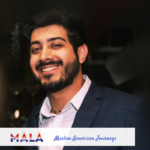Nosherwan Hamid: There is No Monopoly on the Truth
Nosherwan shares how history, culture, struggle, and faith have influenced the development of his identity.
My story is not much different from many others who have fallen victim to the rigidity in Islamic thought. I am an American born Pakistani, Parsi, Pathan, and a self-described Shi’a whose ancestors adopted the Punjabi culture. I am an ethnic Persian and Afghan who is still very much nationalistically a Pakistani Punjabi. In my veins are the vestiges of the Persian, Pashto, and Urdu traditions.
Fate led my ancestors to the South Asian metropolis of Lahore, or, less commonly known by its ancient name, Lahowar: the City of the Blacksmiths. Lahore was once the gateway of Asia, and at different points in time, the home of Afghan, Mughal, Persian, Sikh, Hindu, and even British empires. Almost as if by karmic coincidence, the city’s rich history is just as diverse as my own heritage. There is a saying our local poets ascribed to the city: “If you have not witnessed Lahore, it is as if you were never born.”
Like many others, I feel as though I had been set up for failure. My parents left Pakistan for the promise of more opportunity, with full expectation that I would retain traditional values in a land completely foreign from theirs. Despite being raised in a Western country, I was expected to be fully Eastern.
I have been trying—unsuccessfully—to fight against a 1400-year-old culture that traditionally does not allow for diversity in opinion. I tried to live like the ideal Sunni, Hanifi (Orthodox) Muslim, but human beings are more nuanced than their self-imposed restrictions.
The Middle East devolved after a rich history of philosophical, mathematical, and technological achievement. We succumbed to a unilateral explanation. Now anyone who disagrees with the strictest definition of Islam is believed to be deserving of exile or death.
Pakistani is a nationality, not an ethnicity. Pakistan was a country created in 1947, separated from greater Muslim India to carve out its own nation-state on the basis of the Muslim identity. Within this nationality are countless ethnicities that have never received their fair recognition.
My father’s side are Parsis (or Parsees): ethnic Persians who fled Iran during the first and second Islamic conquests of Persia and migrated to the geographic landmasses now known as Pakistan. My father’s family fled in the 1700s during the second Islamic conquest of Persia by the intolerant monarch Nader Shah, where Shi’ism prevailed over our indigenous religion of Zoroastrianism.
Most of us escaped to Gujarat and made a pact with the kingdom for freedom of religion in exchange for full cultural adaptation and fidelity to the government in power. Less became the mercantile class in the city of Karachi. Yet, even fewer of us—my family included—migrated to Lahore with no expectations. If we were to be respected in society, we were expected to adapt to prevalent Sunni beliefs and pretend we were never anything less than what Orthodox Islam demanded. To this day, we continue to play the part very well. However, in all actuality, we are Persians displaced from our own land and heritage.
My mother’s side had historically resided in Northern Pakistan and Afghanistan in the province of Peshawar. They were the indigenous Buddhists of the Gandhara civilization, among the first recipients of Prince Siddhartha’s and Emperor Ashoka’s message of universal pacifism.
Afghanistan has been a land occupied, but never fully conquered, by many passing empires. The earliest records indicate it was first influenced by Alexander the Great and the Greco-Romans. Then, it was collectively inspired by the hyper orthodox Ghaznavid dynasty, and later by the equally as stringent Khiljis.
We went from one extreme to another—a completely pacifistic Buddhist society to the most violent Central Asian interpretation of Islam. My mother’s side, confined by the restrictions of tribal Pathan etiquette, escaped to Punjab, which was a more liberated society and an invigorated poetic hub that inspired the likes of Mir Taqi Mir, Mirza Ghalib, Amir Khosrow, Allama Iqbal, Juan Elia, and many others. We fell into a rich syncretic society. Like the free thinkers and poets of the past, I contend that there is, and has always been, a middle ground to live within based upon the basic principles of Islamic doctrine.
The truth is, I will never belong anywhere. I will perpetually overthink and unconsciously sabotage any realistic chance at happiness I may ever have. I will not make fully rational decisions. Almost a decade ago, I made the decision to leave Islam, it took me three more years to publicize it and estrange myself from my family. I then married and divorced young, somewhat trying to force myself into Islamic belief because I believed that was the proper Sunni, Hanafi understanding of the deen. I soon found that it did not matter what Muhammad or the Quran said, people will pick and choose whatever is convenient for their lifestyle despite what the source material mandates. My family excommunicated me for my actions and I may never be able to atone for it in this life. As Pakistani culture dictates, they will always continue to guilt and shame me for the things I did not understand. I eventually returned to Islam, but under the more pluralistic Shi’a interpretation. While it is still flawed, and I do not fully believe in the existence of angels, demons, and revealed holy books. I believe it is one of the many vessels to understand human beings’ relationship with the divine. There is no monopoly on the truth and there is more than one way to get to paradise.


